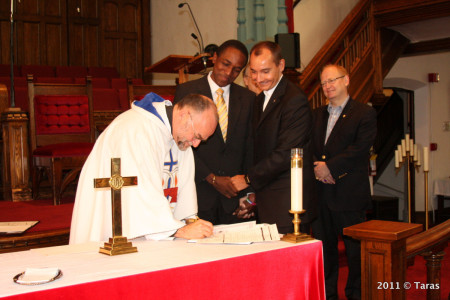Prominent gay-rights activist Maurice Tomlinson has been in court challenging anti-gay laws that prevent LGBT people and other “undesirable people” from entering Belize and Trinidad & Tobago.

Tomlinson, who lives in Toronto, Canada, is from Jamaica, an island considered one of the most homophobic places on Earth, while Belize is a small nation in Central America south of Mexico and east of Guatemala and Trinidad & Tobago is an island nation off the coast of Venezuela. Each has the Caribbean Sea in common along with a Colonial history of anti-gay laws.
In 2003, Belize criminalized homosexuality with up to 10 years in prison upon conviction. Trinidad & Tobago has “buggery” laws that call for up to 25 years in prison and up to 5 years for other gay sexual offenses. In both countries, immigration laws ban LGBT people, prostitutes and other marginalized groups.
Tomlinson contends that the laws violate his freedom of movement in the Caribbean Community and Common Market (CARICOM) and has sued at the Caribbean Court of Justice (CCJ). Both countries are disputing his case.
The Independent reports:
“It remains at the discretion of the immigration officer,” says Tomlinson. “The government has said in their submissions that they don’t plan to invoke it. However, at a previous court appearance one of the CCJ judges asked why the law was not repealed, since there was no intention of enforcing it, and the lawyer for Trinidad said that the law was necessary to keep out “terrorists.”
While it is the first time the immigration laws have been legally challenged, they gained national attention in 2007 when Elton John was due to perform at a jazz festival in Trinidad and Tobago. Many church leaders in the region condemned the decision, with the Archdeacon Phillip Isaac suggesting his presence on the island could tempt locals “towards pursuing his lifestyle”. Demands to ban his entry were rejected by The Tobago House of Assembly and he was granted a special permit to enter.
Though Tomlinson is hopeful, it is unclear when the CCJ will present its final decision.
“I think that I have a very strong case, but I suspect the court will reserve its judgment,” says Tomlinson. “If I am successful, I expect that the CCJ will declare that the laws are in violation of the right to freedom of movement in CARICOM, and require that the governments change them.”
Tomlinson now lives in Canada with his husband. His same-sex wedding made all the news in Jamaica, where his safety became a serious concern after he received death threats. In a recent poll in Jamaica, 82 percent of respondents declared themselves homophobic.








